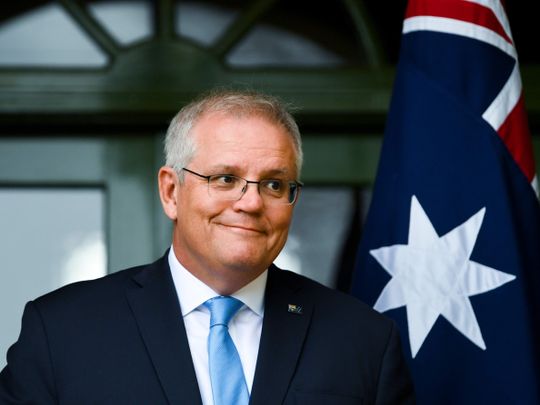
Sydney: Australia will drop some restrictions on international travel in November, easing one of the world’s longest and strictest COVID-19 border closures that has split families and left some residents feeling trapped in their own country.
Prime Minister Scott Morrison announced Friday that the country would reopen its mostly shut border next month, ending more than 18 months of restrictions that earned the Pacific nation the nicknames of “Fortress Australia” and the “Hermit Kingdom,” and left tens of thousands of Australians stuck overseas.
Morrison said fully vaccinated Australians will be able to travel overseas once the country inoculates 80 per cent of its eligible population - a goal set to be reached in early November - but unvaccinated Australians must wait. Individual states and territories will also need to hit 80 per cent before dropping travel curbs, with some on track to get there this month.
The pivot is significant for a nation that long prided itself on keeping coronavirus deaths low and infections near zero, allowing its diverse population to live near-normally while the pandemic ravaged the world. But success came at a heavy cost, with the border closure separating loved ones and the risk-averse approach becoming increasingly futile - and economically damaging - as delta variant outbreaks emerged and vaccination rates climbed.
Caps on the number of returning Australians who are vaccinated will be lifted but will remain for the unvaccinated, Morrison said. And vaccinated Australians returning from abroad will no longer need to spend two weeks in hotel quarantine but can instead isolate at home for seven days. Two states have already begun home quarantine trials.
Morrison acknowledged that people had “suffered” because of the restrictions, which include obtaining permission to leave the country. Only citizens, residents and a few other groups - including movie stars and athletes - have been allowed in since March last year.
“It’s time to give Australians their lives back,” he told reporters, adding that the government was facilitating increased commercial flights for those stuck overseas. “Australia will be ready for takeoff very soon.”
Australia’s biggest airline, Qantas, announced it was bringing forward the restart of flights to London and Los Angeles to coincide with the reopening.
Cancelled during the pandemic
The border news was a relief for Felicity Byrnes, an Australian travel writer living in Germany. She had four flights to Australia cancelled during the pandemic. When her mother recently became seriously ill, she feared she wouldn’t make it home to see her because of the caps on returning Australians. She received an exemption and is now in hotel quarantine in Sydney. The border opening means she and her family will be able to move back to Australia to be closer to her mum, who is recuperating.
“I literally have been dancing around the room with excitement,” she said. “Hopefully no one else will have this situation where they get that phone call in the middle of the night and think they can’t get back in time to see their loved one.”
But Friday’s news frustrated other Australians stuck overseas, who were hoping for an immediate end to the arrival caps and hotel quarantine system.
“I’m pretty gutted,” said Isabella Rositano. The 25-year-old from Adelaide has been stranded in New Zealand since a travel bubble burst in July. She has been crashing with a wrestling coach in Auckland to save money and can’t afford a $6,500 return flight, let alone another $2,000 for hotel quarantine. “I thought this announcement would mean I could come home in the next week or two, and it’s not that.”
John Siapis isn’t getting his hopes up, either. The Sydney construction worker recently celebrated his 45th birthday alone in a hotel room in Auckland, where he was working when the bubble burst. He has had three flights cancelled and his next one isn’t until Dec. 1.
“I watch my wife break down every single day that I can’t get home,” he said, adding that he didn’t care if he had to enter hotel quarantine. “I just want to get home.”
The announcement provided even less clarity for temporary visa holders in Australia, who have been told they can leave the country but won’t be able to return.
“I was really excited,” said Leigh Barlow, 34. “I tuned in to listen to the [public broadcaster] ABC only to hear it was just permanent residents and citizens who are entitled to leave.”
The schoolteacher hasn’t seen her family in Manchester for two years but worries that if she leaves, she won’t be able to return to her life and partner in Sydney. Her grandfather died last month but she wasn’t able to go to England for the funeral. Barlow felt “trapped.”
“Most of my friends in the UK just refer to Australia as a prison island now because you can’t leave,” she said.
Welcoming tourists
Morrison did not say when foreigners will be able to visit. A news release said only that the government would “work towards welcoming tourists back to our shores.” But a spokesman for Morrison’s office said foreigners will be able to visit Australia “before Christmas.”
The prime minister also said Australia will recognize the Chinese-made Sinovac vaccine and the Indian-made Covishield shots for the purposes of allowing returning Australians to quarantine at home.
Australia has been battling an outbreak of the delta variant that has led to widespread lockdowns.
New South Wales, the most populous state, has led the way to living with the virus after a rapid rise in vaccination rates and is scheduled to reopen on Oct. 11. The state’s premier, Gladys Berejiklian, resigned on Friday in connection with a corruption inquiry, though there was no indication that her exit would jeopardize the reopening.








